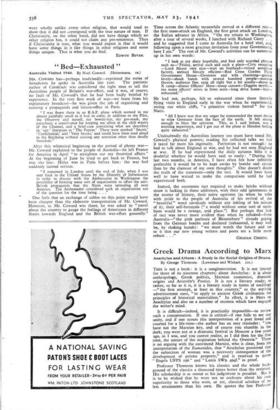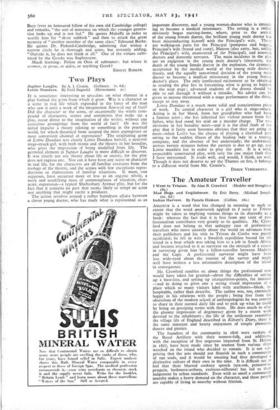Greek Drama According to Marx
THIS is not a book : it is a conglomeration. It is not (except for three of its nineteen chapters) about Aeschylus: it is about anthropology, Greek politics, Mandan economics, dramatic origins and Aristotle's Poetics. It is not a literary study; or rather, so far as it is, it is a literary study in terms of sociology —" the first attempt, at least in this country," so the aspiring advertisement runs, "to apply to ancient Greek civilisation the principles of historical materialism." In effect, it is Marx on Aeschylus and also on a number of etcetera which have engaged the writer's mind.
It is difficult—indeed, it is practically impossible—to review such a concatenation. If one is critical—if one fails to see any unity, and if one scouts this interpretation of a poet loved and courted for a life-time—the author has an easy rejoinder: "you have not the Marxian key, and of course you stumble in the dark; you were not at a dramatic festival in Moscow a few years ago, as I was, and you cannot realise, as I did then for the first time, the nature of the inspiration behind the Oresteia." There is no arguing with the convinced Marxist, who is clear, from his interpretation of the Eumenides, that "Aeschylus perceived that the subjection of woman was a necessary consequence of the development of private property," and is resolved to quote Engels UFPS 196" and "Lenin SW9. 494f." in proof.
Professor Thomson knows his classics and the whole back- ground of the classics a thousand times better than the reviewer. His scholarship is as sound as his judgement is peculiar. But it is to be wished that he were not so cocksure about his own superiority to those who were, or are, classical scholars of no less attainments than his own. He quotes the late Professor
Bury (ever an honoured fellow of his own old Cambridge college) and remarks, "the sort of nonsense on which the younger genera- tion looks up and is not fed." He quotes Mahaffy in order to scarify him for "sheer rubbish" and then to attack the great memory of "another member of the same class," Edmund Burke. He quotes Dr. Pickard-Cambridge, admitting that within a narrow circle he is thorough and acute, but instantly adding, "Outside it, he does not think at all." One of the virtues culti- vated by the Greeks was Sophrosyne.
Much learning : Pelion on Ossa of substance: but where is cosmos, or peras, or aidos, or anything Greek?
ERNEST BARKER.































 Previous page
Previous page